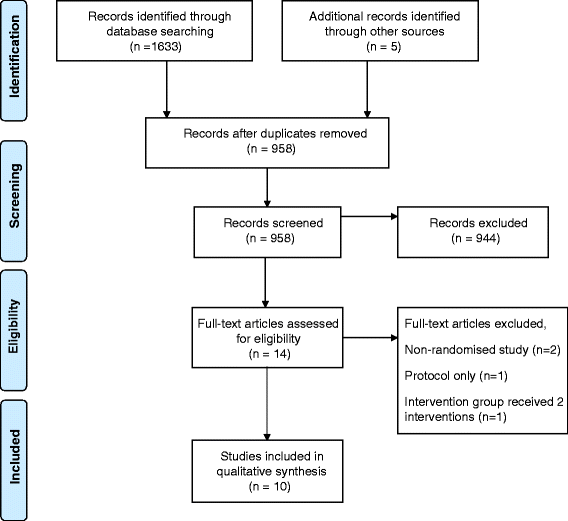A systematic review of randomised control trials of sexual health interventions delivered by mobile technologies
- PMID: 27514851
- PMCID: PMC4982424
- DOI: 10.1186/s12889-016-3408-z
A systematic review of randomised control trials of sexual health interventions delivered by mobile technologies
Abstract
Background: Sexually transmitted infections (STIs) pose a serious public health problem globally. The rapid spread of mobile technology creates an opportunity to use innovative methods to reduce the burden of STIs. This systematic review identified recent randomised controlled trials that employed mobile technology to improve sexual health outcomes.
Methods: The following databases were searched for randomised controlled trials of mobile technology based sexual health interventions with any outcome measures and all patient populations: MEDLINE, EMBASE, PsycINFO, Global Health, The Cochrane Library (Cochrane Database of Systematic Reviews, Cochrane Central Register of Controlled Trials, Cochrane Methodology Register, NHS Health Technology Assessment Database, and Web of Science (science and social science citation index) (Jan 1999-July 2014). Interventions designed to increase adherence to HIV medication were not included. Two authors independently extracted data on the following elements: interventions, allocation concealment, allocation sequence, blinding, completeness of follow-up, and measures of effect. Trials were assessed for methodological quality using the Cochrane risk of bias tool. We calculated effect estimates using intention to treat analysis.
Results: A total of ten randomised trials were identified with nine separate study groups. No trials had a low risk of bias. The trials targeted: 1) promotion of uptake of sexual health services, 2) reduction of risky sexual behaviours and 3) reduction of recall bias in reporting sexual activity. Interventions employed up to five behaviour change techniques. Meta-analysis was not possible due to heterogeneity in trial assessment and reporting. Two trials reported statistically significant improvements in the uptake of sexual health services using SMS reminders compared to controls. One trial increased knowledge. One trial reported promising results in increasing condom use but no trial reported statistically significant increases in condom use. Finally, one trial showed that collection of sexual health information using mobile technology was acceptable.
Conclusions: The findings suggest interventions delivered by SMS interventions can increase uptake of sexual health services and STI testing. High quality trials of interventions using standardised objective measures and employing a wider range of behavioural change techniques are needed to assess if interventions delivered by mobile phone can alter safer sex behaviours carried out between couples and reduce STIs.
Keywords: Behaviour change; Randomised controlled trials; Sexual Health; Sexually transmitted infection; mHealth.
References
-
- Grodstein F, Goldman MB, Cramer DW. Relation of tubal infertility to history of sexually transmitted diseases. Am J Epidemiol. 1993;137(5):577. - PubMed
-
- Stanberry LR, Rosenthal SL. Sexually transmitted diseases: vaccines, prevention, and control. Oxford: Academic; 2013.
-
- Report on global sexually transmitted infection surveillance 2013. World Health Organistion. Geneva: United Nations; 2013. http://apps.who.int/iris/bitstream/10665/112922/1/9789241507400_eng.pdf?.... Accessed 28 Jan 2016
-
- Newman L, Rowley J, Vander Hoorn S, Wijesooriya NS, Unemo M, Low N, Stevens G, Gottlieb S, Kiarie J, Temmerman M. Global estimates of the prevalence and incidence of four curable sexually transmitted infections in 2012 based on systematic review and global reporting. PloS One 2015;10(12). doi: 10.1371/journal.pone.0143304 - PMC - PubMed
Publication types
MeSH terms
LinkOut - more resources
Full Text Sources
Other Literature Sources
Medical


